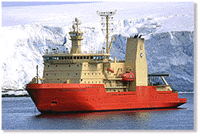|
This portion of the USGLOBEC www site provides a forum for GLOBEC researchers in the field to present interesting observations, unexpected results, and the current status of ongoing research. Our intention is to provide a vehicle for dissemination of timely results from GLOBEC research in our various study sites. Notes from the Field will feature hints of things to come, rather than definitive results. It will provide a way of sharing findings and observations quickly, and will promote exchange of ideas among GLOBEC scientific investigators and other interested parties as new results come in from the field. All GLOBEC investigators are encouraged to contribute observations, images, and intriguing findings to Notes from the Field .... of the Gulf of Alaska During May and late July / early August, 2003, USGLOBEC researchers from Oregon State University (OSU), the University of Alaska-Fairbanks (UAF), and several partner institutions conducted a series of data-gathering cruises in the Gulf of Alaska aboard the Research Vessel R/V Wecoma. Sample plots - and details of how such data are collected / analyzed - of temperature, salinity, and various other physical oceanographic measurements prepared during the May cruise are available on the SALMON Project (Sea-Air-Land Modeling and Observing Network) website. In addition, daily log reports - complete with onboard photos of the scientists at work / play - were filed throughout the mid-summer cruise by Britta Hinrichsen, an OSU undergraduate who joined the more senior scientists to pick up some valuable 'cruise experience' .... We invite you to read her daily posts to learn what life aboard a research vessel at sea is really like. in the Southern Ocean During April - May, 2002, several USGLOBEC researchers joined the scientific party aboard the Research Vessel R/V Laurence M. Gould in the frigid waters surrounding the West Antarctic Peninsula. Dr. Se Jong Ju, a lipid biochemist at the University of Maryland, conducts research on biochemical methods for age determination of krill, and in-between his scientific endeavours he periodically passed along some photos from his stint aboard ship. We invite you to enjoy his photos / comments to get a flavor for "Research in the Field," Antarctic style .... Working Group The Optical Plankton Counter (OPC) is a specialized oceanographic instrument that when towed behind a research vessel collects continuous, real-time data on zooplankton abundance. It is designed to separate zooplankton by size, and works by matching individual peaks in the size spectrum with specific plankton taxa. Current models yield good results in regions where species diversity is low, but perform poorly in areas of high species diversity where peaks overlap and become 'smeared.' With support from U.S. GLOBEC, members of the OPC Working Group are now hard at work designing the next generation of laser-assisted OPCs, and you can follow the progress of their research .... National Geographic In April, 2001 a reporter from the National Geographic Society was invited to join the scientific party aboard the Nathaniel B. Palmer to cover a US Southern Ocean GLOBEC cruise to the Marguerite Bay study site. Daily updates were posted to a special section of the National Geographic web site, an excellent on-line resource that also includes an informative summary of the scientific mission / goals that were addressed. Periodic progress reports were also filed by Dr. Aparna Sreenivasan, a student in the science communication program at UC-Santa Cruz ....
|
Please address any comments, suggestions or questions to: US GLOBEC Webmaster

